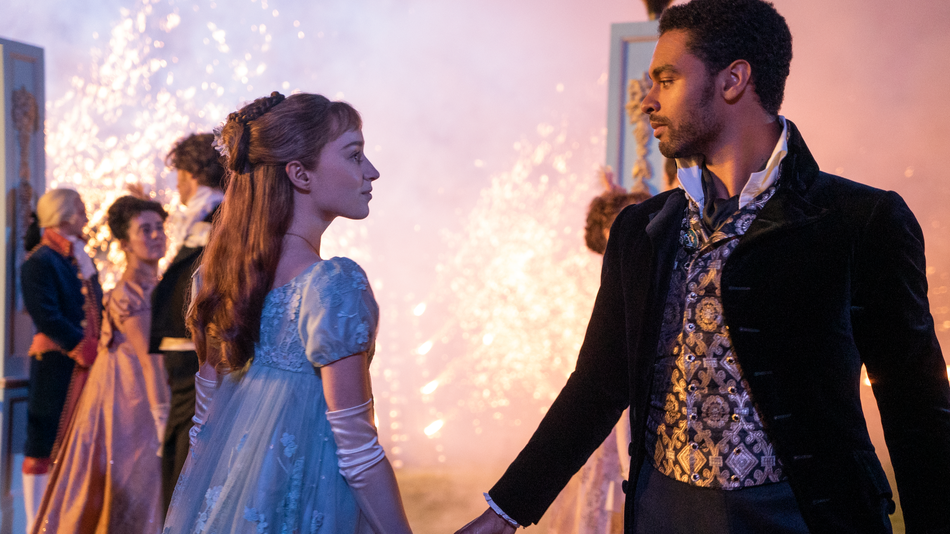
Image: LIAM DANIEL/NETFLIX
Bridgerton doesn’t really seem like a Shonda Rhimes show at first. The inaugural title in Rhimes’ multi-series deal with Netflix, the uber popular period drama is a considerable change of pace from Shondland shows like Grey’s Anatomy, Scandal, and How to Get Away with Murder.
Nothing screams “Watch more of me right this instant!” like a Shonda-style flashback.
With nary a sexy lawyer or dreamy doctor in sight, Bridgerton forgoes a high-stakes workplace setting to instead adapt a historical romance series from author Julia Quinn into eight episodes of decked-out, horned-up spectacle — landing somewhere between Dangerous Liaisons and Gossip Girl.
It’s a stellar showing from creator Chris Van Dusen (Mashable’s Alexis Nedd said as much in our official review), but with a spiritual flourish from executive producer Rhimes that does wonders for the show’s binge-worthiness. Truly, nothing screams “Watch more of me right this instant!” like a Shonda-style flashback: one of those bizarrely filtered, but still iconic cutaways revealing juicy secrets at just the right time.
Over her 15 years at ABC, Rhimes used this blunt narrative device to change the game for tons of beloved characters, often many, many times over the course of a series. The present day drama would continue on as expected, until a slow pan or sudden crossfade gave way to The Past.
Olivia Pope recalled her secret pseudo-engagement to the President of the United States this way. Dr. Meredith Grey reflected on her messed up childhood (before reflecting on her even more messed up adulthood) this way. And, of course, the law students of How to Get Away with Murder looked back on getting away with all that murder this way. It always changed everything.

Oh no, past Olivia: run.
Image: abc
It’s an obvious pull from the toolbox of soap operas, known for their outrageous turns, extreme coincidences, and shameless retconning. But when Shonda Rhimes does it, in all her glossy Shonda Rhimes glory, there is something to be said for the tantalizing possibility of an “anything can happen” TV universe.
There is something to be said for the tantalizing possibility of an “anything can happen” TV universe.
Sure, those flashback scenes can feel a bit clunky in the context of shows with otherwise linear timelines (or get downright confusing when employed too often.) But they also give momentum to those worlds, continuously rewarding viewers who keep watching with increasingly complex drama.
Even when a Shondaland show introduces twists and turns some viewers don't particularly like, the promise of these sudden perspective shifts assure many they’ll get more twists and turns they do like down the road. That narrative tactic is especially effective as it appears in Bridgerton.
For those unfamiliar, Van Dusen’s series centers on the will-they-won’t-they drama of Regency era London’s dating scene — a perfect setting for flashbacks to wreak havoc. In fact, much of Season 1’s central plot hinges on the promise of continuing royal lineage, a narrative arc shows like The Crown have taught us can span decades.
As a result, Bridgerton fans get to know the motivations of the series’ leading man Simon Basset (played by the extremely good looking Regé-Jean Page) largely through flashbacks. It’s the same framework Rhimes used to give depth to iconic characters like Annalise Keating, presenting them as part of dramatic lives that span beyond the scope of the show’s “current” events. Simon is a more engaging character for it, and his narrative future that much more compelling.

Oh, god, past Wes: you *definitely* run!!
Image: ABC
Of course, Simon’s character was originally imagined by Quinn (the author of the Bridgerton books), and Rhimes didn’t write on the show herself. Still, Van Dusen’s presentation of this character through a format perfected by Rhimes is an exciting development. While Netflix-era Shondaland may be different from ABC-era Shondland, it’s no less obsession-worthy. And that’s something to celebrate.
Bridgerton is now streaming on Netflix.
